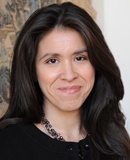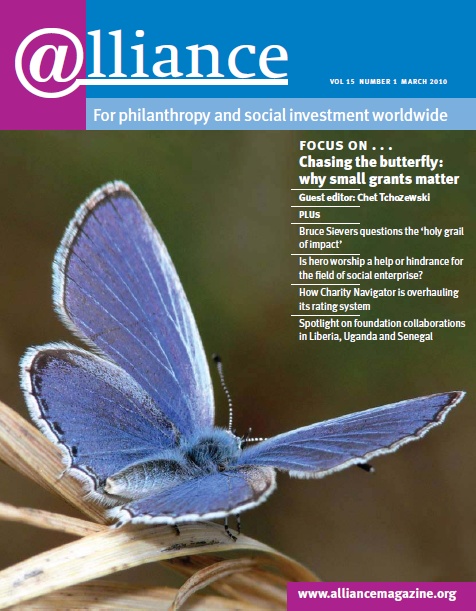For those of us in the field of philanthropic advice, it is exciting to see the growth in attention that the topic is receiving.[1] However, this area is still not widely recognized or well understood, so it seems appropriate for the first instalment of a column on philanthropic advice to provide an overview (by no means comprehensive) of the general landscape of the field.
 A web search under terms like ‘philanthropic adviser’ and ‘donor adviser’ is largely unhelpful. For the most part, it simply brings up philanthropic advisory firms, wealth management and law firms that offer philanthropic services, and a few lists of what to look for in a philanthropic adviser (even Wikipedia came up with no more than a list of other entries in which the words ‘philanthropic’ and/or ‘adviser’ appeared). What it shows is that, while there is a wide variety of philanthropic service providers with specialized and distinct skills, there is no neutral and trustworthy resource that donors can use to assess the quality of the services provided or the ability of a given firm to meet their needs.
A web search under terms like ‘philanthropic adviser’ and ‘donor adviser’ is largely unhelpful. For the most part, it simply brings up philanthropic advisory firms, wealth management and law firms that offer philanthropic services, and a few lists of what to look for in a philanthropic adviser (even Wikipedia came up with no more than a list of other entries in which the words ‘philanthropic’ and/or ‘adviser’ appeared). What it shows is that, while there is a wide variety of philanthropic service providers with specialized and distinct skills, there is no neutral and trustworthy resource that donors can use to assess the quality of the services provided or the ability of a given firm to meet their needs.
For donors, this multitude of services and providers can be confusing and overwhelming. As practitioners, we must not only provide the services but also promote a greater awareness of the value of advisers.
More than just one kind of service
So, what is a philanthropic adviser? Generally speaking, philanthropic advisers are professionals who work with a range of donors – from individuals, family foundations and trusts to corporations and large, established foundations – to help them make their giving more effective. The services offered depend on the capacity and expertise of the adviser or firm, but many firms – including ours, Strategic Philanthropy, Ltd, Rockefeller Philanthropy Advisors and Arabella Philanthropic Investment Advisors in the US and Active Philanthropy and wise Partnership in Europe – provide a full complement of services ranging from establishing a giving programme or vehicle to carrying out formal evaluations of giving portfolios and practices. Some firms also have the capacity to offer in-house management of trusts and foundations.
The firms mentioned above can be considered (for the purposes of this article, at least) as ‘primary’ philanthropic advisers: professionals who specialize in providing services exclusively to donors and who bring grantmaking and non-profit expertise to their work. They are primarily based in wealth centres such as New York, San Francisco, Chicago, Geneva and London but they are beginning to expand to cover other regions.
The value of offering philanthropic guidance has also produced ‘secondary’ philanthropic advisers: professionals from banks, wealth management firms, law firms, accounting firms and others that already provide services to wealthy individuals and companies. In many ways, this expansion is a natural response to questions that existing clients already have about how to manage their giving. For donors, turning to a trusted adviser is practical and logical. For advisers, it’s a way in which to expand the array of billable services and market a niche area to potential clients.
Beyond advisers…
Philanthropic services are by no means limited to professional advisers, however. Underneath these two tiers is a whole range of organizations providing advice and guidance in some form or other to donors: donor-advised funds and community foundations; organizations that do research or promote philanthropy; formal donor education programmes like the Institute for Philanthropy in the UK and The Philanthropy Workshop West in California; degree and diploma programmes focused on developing and enhancing knowledge of philanthropic practice such as those run by the Center on Philanthropy at Indiana University in the US and the new Centre on Strategic Philanthropy at Erasmus University in the Netherlands.
It is also important to stress the growth of less formal means of learning offered by giving circles, women’s funds, intermediary grantmaking organizations, collaborative funding structures, and issue area and geographically oriented affinity groups. The Chicago Global Donors Network (a spin-off of our local regional association of grantmakers, or RAG) holds an annual conference on international giving and hosts workshops through which donors network and learn best practices. Similar groups can increasingly be found in major cities in the US and Europe, especially groups that work with international partners to advance understanding of issues like HIV/AIDS, poverty, water access and human rights.
Can we find a common platform?
So there is plenty of advice and information available. But advisers have to be willing to admit that sometimes one provider will not meet all of the needs of a given client. As members of an emerging field, we must carefully consider the value of increasing the relevance and impact of the field against the importance of securing or maintaining clients (especially in the case of advisers working in a for-profit structure). This means knowing the other players in the field and working together, not only to offer advice but also to advance a philosophy of responsible financial and philanthropic investing.
This type of cooperation still has a long way to go. It’s not always easy to reach a common agreement about best practices for guiding clients in their giving since, for many of us, the key to successfully supporting clients is customizing our services to their needs and interests. However, there are several areas that many primary advisers would probably agree can serve as benchmarks of best practice, including:
- clarification of giving mission, values, intentions and expectations;
- assessment of financial capacity to give;
- establishment of relevant giving strategy and evaluation process, including decision-making procedures and stakeholders;
- identification of an appropriate giving vehicle(s);
- ongoing support of the giving strategy, including vetting selected organizations;
- review of the evaluation process and application of lessons learned (both internally and from peers) to ongoing giving.
Additionally, a prudent adviser should know the implications of the decisions their clients make (or plan to make) in relation to tax benefits and reporting, and ensure donor intent and compliance with legal requirements, including those of different jurisdictions involved.
If one sees these topics as the parameters of charitable best practice, then the input of legal, financial and philanthropic experts should be a normal part of doing business. Only by covering these bases can any adviser say that they are doing all they can to protect their client’s investment from a financial and personal point of view, especially considering the emotional connection that most donors have with those they give to.
In some cases, seeking guidance from different disciplines may be a challenge since deep knowledge of charitable practices is only slowly becoming part of training methodologies in different fields. More sophisticated certification and educational programmes are offered for financial and wealth management experts, as well as trust and estate planning lawyers, through programmes such as Chartered Advisors in Philanthropy and membership organizations like the International Association of Advisors in Philanthropy.
For primary philanthropic advisers, membership organizations such as the National Network of Consultants to Grantmakers, the Council on Foundations and local RAGs are beginning to think about how to vet advisers and create networks for professional development and support that benefit advisers and serve as a resource for potential clients. New Philanthropy Capital in the UK, for example, has been researching the philanthropic advisory field and is in the process of setting up a steering group drawn from different types of adviser to guide the development of this field.
 Looking into the future
Looking into the future
If we had a crystal ball to help us see how this nascent field will grow in the coming years, we might see advisers strengthening cross-disciplinary collaboration in the service of donor effectiveness. We might see an established framework that provides us all with an ethical guide and standards of practice to further professionalize and legitimize our work. We might see continued growth in the field, especially as a result of the pending intergenerational transfer of wealth in the US and Europe and the emergence of new centres of wealth around the world. We might also be able to see a greater understanding of the work, its purpose and impact, through increased media attention. This inaugural philanthropic advisory column is a wonderful first step.
1 See ‘Is philanthropy ignoring the real money?’ Alliance, December 2009
Betsy Brill is president of Strategic Philanthropy, Ltd and Hilda Vega is senior advisor. Emails betsy@stratphilanthropy.com and hilda@stratphilanthropy.com





Comments (0)